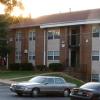From Public Housing to Student Housing: Gentrification in East Athens

Photo Credit: Joshua L. Jones
Rental houses for UGA students are sprouting up right next door to Nellie B Homes in a part of East Athens that two decades ago was an open-air drug market.
This is the third and last installment of a series on the history of East Athens. The first installment covered the Civil War and Reconstruction, while the second deals with urban renewal pushing African Americans out of their homes.
“Where white folks wouldn’t stay—wouldn’t even walk—now they’re building houses,” marvels Rev. Archibald Killian, who’s watched East Athens since he was a boy in the 1930s, then as one of Athens’ first black police officers, then as a community leader. Pizza places wouldn’t deliver to East Athens in the 1990s and early 2000s, nor could they get a newspaper delivered just blocks from the paper’s office, residents say. The “Iron Triangle” at Nellie B was an open-air drug market after dark during the crack crisis, and violent crime and prostitution plagued the area.
Few could have foreseen how East Athens would change. Expensive student-oriented housing grows like mushrooms, apparently fed by a steady stream of suburban Atlanta wealth. In roughly the span it takes a student to get a graduate degree, the accelerated gentrification has altered the character of East Athens. What Athens-Clarke County Commissioner Harry Sims calls “McMansions” spring up anywhere there’s space. Where there’s not, older homes are acquired and demolished. Expensive new homes sit right next to public housing, BMWs next to box Chevys, Tri Delts near the trap.
Evelyn Wright, who has spent most of her 82 years on First Street, hears a band practice at night behind where an outhouse used to be. A group of guys on Herman Street park their Gwinnett County-tagged cars under signs announcing security cameras overseeing their outpost just a few hundred feet shy of the old “Iron Triangle.” They’re careful to arm the alarms after one housemate entered the kitchen one late night in August to find a burglar making off with a laptop and a TV. It feels a little like a compound.
UGA graduate student Ginny Hanger has lived for four years in another compound-like settlement of student houses adjacent to public housing on Arch Street. She recalls the door-to-door panhandlers and car break-ins that marked the early years.
“It was happening a lot,” she says. Her new roommate, Haley Klein, moved in six months ago, and the two agree that the neighborhood is already considerably safer than it was when Hanger moved in.
Fixing Up the Iron Triangle
As surprising as the pace of the gentrification is, it isn’t something that couldn’t have been predicted. An intensive, $2 million revitalization project coordinated in the 1990s by the ACC government and local neighborhood leaders and activists made the Nellie B/Triangle Plaza area its focus. A few years later, the county government set its sights on the Dudley Park and riverside district to construct an ambitious network of greenways and trails.
Sims, who has represented East Athens for more than two decades, lists the impressive list of neighborhood improvements around Nellie B: the Miriam Moore recreation center, a new park, the revitalization of the Triangle Plaza, the paving of streets, the laying of sidewalks and the location of a police substation at the Triangle.
“It’s a lot of things in my 22 years of being on the commission that have transpired, and that I’m real proud of,” says Sims.
The surrounding property owes much, or perhaps all, of its hockey-stick-shaped valuation trend to the radical changes in the Triangle and the river area. Before the revitalization project, the area around the Nellie B public housing was renowned as the “Iron Triangle,” infamous for its criminal character, both real and imagined. Former mayor Gwen O’Looney remembers meeting a friend after 10 p.m. in the Iron Triangle in 1989, at the height of Athens’ crack crisis. She recalls young kids running baggies to buyers in cars and one young boy who stumbled, scattering his delivery of rocks across the pavement. He scrambled along the dark pavement to collect the merchandise and bolted off to his assigned buyer.
To be honest with you, I’m just waiting on some investor to come and buy out the Triangle Plaza. Because I see what’s happening.
The new police substation kept the hustlers in check—or at least forced them to reconfigure their activity, say Sims and Isaiah Ellison, an East Athens business owner. The Triangle Plaza was given a dramatic facelift, and parks and infrastructure projects broke ground. A change in federal policy aligned with a new, more progressive ethos in Athens, and the worst impulses of urban renewal were replaced with more bottom-up participation of local residents. Community leaders like Miriam Moore and Evelyn Neely assumed leadership roles, and renovation and revitalization replaced the wholesale demolition model of earlier urban renewal.
Dudley Park, too, had come to be considered a problem area. It’s unclear how much actual crime there was in the park and how much its transition to a park frequented by African Americans after decades of white ownership created the impression of danger. Ellison does remember some amount of crime afflicting the park. Its perfectly functional basketball court—the good one that Sims had been lucky enough to play on a generation before, when it was whites-only—was destroyed by the county government along with the community center. The use of “bad language” by park-goers was the unconvincing euphemism for why the court was removed, according to nearby residents.
In any case, Dudley went from white to black to green, in two senses. O’Looney and Sims point to how the ambitious new greenway originating in Dudley Park improved property values in the area. And increase they have, doubling in some cases. New student housing is wedged into any available space near Dudley, sometimes maximizing parcels by shoehorning multiple narrow houses onto a property.
Forced Out of Homes
Though the new student-oriented development lacks some of the brutality of urban renewal, a quieter, partially unseen displacement is proceeding throughout East Athens all the same. The rising tide of property values means radically higher property tax bills for many older homeowners on fixed incomes. The taxes are “sky high” for many struggling retirees, Sims says. Unable to pay their tax bill, lifelong residents find themselves forced to sell to developers, often in hasty, unfair transactions, says Ellison.
“Unfortunately, the community didn’t realize the value of the resources they had,” he says, “so it wasn’t marketed so that the property owners could realize a reasonable return on their property.” Black homeowners are “bombarded from every side,” he says, “and unfortunately, right there on the Triangle Plaza, you’re in the crux of the poverty stricken area, the poorest of the poor.”
Wright is inundated with calls and fliers in her mailbox from Realtors about her house on First Street, in which she’s spent most of her life. Sims hears the same from his constituents throughout East Athens.
“Everybody’s getting them,” says Ellison about the fliers. “Somebody with deep pockets” is coming in, he says, and offering cash and a quick closing.
It’s a mixed blessing: Some homeowners are excited about the prospect of selling their property for more than they expected, says O’Looney. But suspicion and resentment can be found throughout formerly black neighborhoods that face gentrification. There is still a powerlessness that black residents feel against affluent, mostly white 20-somethings overtaking what’s theirs.
“There’s a certain community ownership that the long-term residents have,” says Ellison. “The community’s quickly vanishing before their eyes, and they feel helpless and can’t do anything about it. And that resentment spills over. They’re feeling squeezed out of the their communities.”
There is no defense against gentrification like the one deployed to protect East Athens against Yankee troops. “We can’t stop the changes,” says lifelong resident Xavier Burton. “We can’t stop it.” Even Commissioner Sims watches in relative powerlessness. “There’s no slowing it down,” he says.
“I don’t think the trend will stop,” says Ellison. “To be honest with you, I’m just waiting on some investor to come and buy out the Triangle Plaza. Because I see what’s happening.”
As the trend of urban infilling continues, public housing occupies large tracts of real estate that make developers salivate. Just down the road, Atlanta became a pioneer when it was the first major city in the United States to completely destroy all of its public housing, opening the way for the sort of radically invasive development Ellison fears. The Atlanta experiment has left the city with an unaccounted diaspora of its poor in the wake of its gentrification.
“That’s what gentrification is: displacement, displacing folks without sharing with them,” says Ellison.
A nearly two-century history—much of it still living in the architecture, geography and culture—now faces what seems the implacable tide of transience. Students, whose concern for the area extends only to the few years of their stay, replace lifelong residents.
Thankfully, the county government has commemorated and preserved a great deal of the history. ACC is finishing up work on an access path to the Thunderbolts’ bunker. The historical walk in Dudley Park gives visitors a view through more than 200 years to the area’s European founding. The ongoing effort to preserve the R.E.M. steeple and the success in stopping the destruction of the Murmur trestle protect that component of East Athens history, too. But African American history is disappearing practically by the day, along with African Americans. Entire streets from a bygone era exist only as quiet, wooded indentations in the earth that wind almost imperceptibly through an increasingly forgetful neighborhood.
Ellison hopes the changes in East Athens will preserve the neighborhood’s character and not achieve the uniformity of suburban Atlanta. “I don’t think the trend will stop,” he says, “But I would love to see more inclusion of community in what’s happening in the area.”
Ellison’s best-case scenario? “I wish people could invest in a way to keep the neighborhood as a melting pot, to make the neighborhood more representative of the city itself. Because a lot can be done in the area to improve the lives of everybody.”












comments